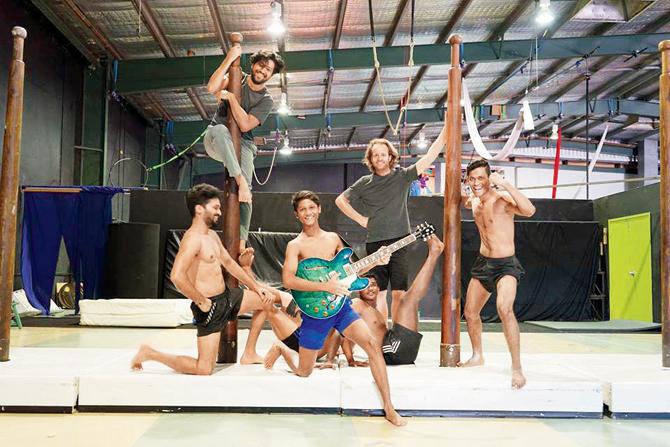A mallakhamb performance directed by an Australian will marry contemporary music with an ancient Maharashtrian sport

The mallakhamb artistes in mid-performance
Sometime in the early 18th century, Balambhatta Dada Deodhar was in a fix. He was Maratha ruler Baji Rao Peshwa II's personal trainer. But some outsiders had challenged him to a wrestling match, and he wasn't convinced that he'd win. This made Deodhar jittery. He thought about the untold humiliation he'd face if he was indeed defeated. And his nerves were on edge till one day, Hanuman appeared to him in a vision. The monkey god performed incredible feats of skill and strength while swinging alone from a tree. It's as if the deity was wrestling against himself. So, Deodhar studied every move of his to later replicate them and improve his own capability.
ADVERTISEMENT
And that's what eventually helped him vanquish his opponents and save face before the king.
It's a legend that is said to have revived the ancient Maharashtrian sport of mallakhamb, initially practised in the 11th century before going dormant for about 600 years. There's nothing quite like it anywhere else in the world. A performer combines his core strength and physical elasticity to put on a spectacle that involves only teakwood poles or cotton ropes being used as props that support incredible acrobatic manoeuvres. The philosophies that govern wrestling — or kushti — lie at the core of the sport. It might have shades of modern gymnastics. But the age-old practice has its roots firmly placed in this state.

They pose during rehearsals with Donn Bhatt (on the pole) and Ben Knapton (back)
Now, Australian director Ben Knapton will stage a rather unique mallakhamb performance, which he conceived last year, at Royal Opera House this weekend. The event will involve contemporary electronic music providing a sonic backdrop for the ancient Indian sport. City-based composer Donn Bhatt will kick off the proceedings with a set that builds an aural atmosphere reminiscent of life in Maharashtra. It starts with a sample of sounds from the sea, for instance, before five artistes from Mallakhamb India, a pioneering troupe from Mumbai, display their gravity-defying skills.
Knapton tells us over email that there was a lot of research that went into the act before he started giving it shape. He then did some back-and-forth with Bhatt for about two months to finalise the accompanying musical piece. He says, "I was looking to create physical material for the show that is exciting and thrilling, but which also speaks of something greater that the audience can see and feel. The show does not really have a story. There are definitely ideas embedded in the work, like time, politics, identity and our connection to the past. But these things aren't demonstrated directly. Rather, they are embedded into the work in different ways: sometimes, in the choreography or the music, or in a combination of the two."
The director adds that the final product eventually premiered in his home country in 2018 at a festival that was part of the Commonwealth Games. And Bhatt gives us a sense of the challenges that entailed when he tells us, "For me, it was a case of watching a bunch of guys burning 4,000 calories in 20 minutes while I'm just twiddling some knobs and saying, 'Oh, I'm quite tired. Can we break for lunch?' But the real challenge lies for them. At the Sydney Festival, for instance [where they performed early this year], it was quite hot and the show was out in the open in the afternoon. So, they all got blisters on their feet, which made things really difficult."
In that sense, performing within the closed, opulent ramparts of Royal Opera House will be a welcome change. "Mallakhamb is actually a sport that people now perceive to be an art form. The audience might thus view it as a type of contemporary circus," says Rajesh Amrale, who's been part of the show, before Kapton adds one of the advantages of playing at this iconic city venue. "I suspect that performing there will feel quite intimate, which is a good thing because the closer the audience is to the performers, the more they can feel their presence," he tells us, indicating that if you book yourself a seat, you can be up, close and personal with a group of artistes continuing a tradition that — if legend is to be believed — got a shot in the arm thanks to Deodhar's divine vision.
On: August 2, 7 pm
At: Royal Opera House, Charni Road, Girgaum.
Log on to: insider.in
Cost: Rs 499
Catch up on all the latest Crime, National, International and Hatke news here. Also, download the new mid-day Android and iOS apps to get the latest updates
 Subscribe today by clicking the link and stay updated with the latest news!" Click here!
Subscribe today by clicking the link and stay updated with the latest news!" Click here!






